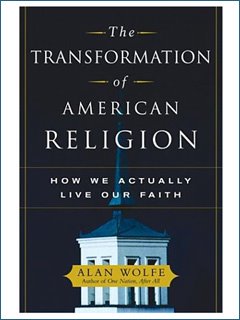 Alan Wolfe's The Transformation of American Religion: How we actually live our faith perhaps might more accurately be titled "the closing of the American religious mind." Wolfe, a social scientist, wants readers to know upfront that "I do not write about religion out of religious conviction. …I am not, and never have been, a person of faith." Nonetheless he seems awfully distressed by the picture he draws of a religious landscape in which churches aim, apparently above all, to cater to the needs of self-centered individualists. "American faith has met American culture -- and American culture has won."
Alan Wolfe's The Transformation of American Religion: How we actually live our faith perhaps might more accurately be titled "the closing of the American religious mind." Wolfe, a social scientist, wants readers to know upfront that "I do not write about religion out of religious conviction. …I am not, and never have been, a person of faith." Nonetheless he seems awfully distressed by the picture he draws of a religious landscape in which churches aim, apparently above all, to cater to the needs of self-centered individualists. "American faith has met American culture -- and American culture has won."Wolfe is a sometimes sharp, and often sharp-tongued, observer.
- "…all of America's religions face the same imperative: Personalize or die."
- "…the Bible, considered as a body of ideas, is something of an afterthought, there to ratify ideas already so well formed that one need never puzzle over them."
- "Pentecostal forms of religious expression have become popular because -- like increasing numbers of school teachers, leaders of therapeutic communities, mental-health professionals, and even occasional academics who live in secular worlds -- they seek authenticity through experience rather than ideas."
- "In many contemporary American religious precincts, Antigone would have been asked if she wanted help in letting go her obsession with her brother."
The title of Wolfe's last chapter "Is Democracy Safe from Religion?" points up where all this rather disdainful description of the religious landscape leads him. Wolfe wants above all to assure readers that the religious boobs he has been depicting needn't be feared. He assures us that:
As someone who, as an uppity woman and a lesbian, constantly fears being a target of the religious right, do I find Wolfe reassuring?…believers who prefer a God of love to a God of truth are not going to kill for their beliefs -- or give their support to those who do. … As much as we may be tempted to denounce as flighty Americans who change their faith as often as their cars, we ought to recognize that religious switching acts as a kind of insurance against bigotry. …Sometimes the more seemingly frivolous of the ways Americans practice their faith turn out to be blessings in disguise.
Not particularly. Popular commodity culture is pretty easy to ridicule; and ridicule is an easy form of dismissal. Ill-informed, incurious people who seek out faith practices that do not challenge them to experience a larger human family may not be malevolent. But they can be oblivious to active evil done out of their sight. And we live in a society increasingly segregated by wealth and education that enables many not to have any idea how others live, as recent events in flooded New Orleans showed us.
Moreover, there are "religious" leaders, currently exemplified by James Dobson of Focus on the Family, who seek to use the unexamined enthusiasms of ordinary seekers to build power for their fascist agendas. The followers may have benign intent -- however democracy will not be safe from these right wing authoritarians without continued struggle that includes the many religious people who actively oppose any intolerant agenda.
No comments:
Post a Comment